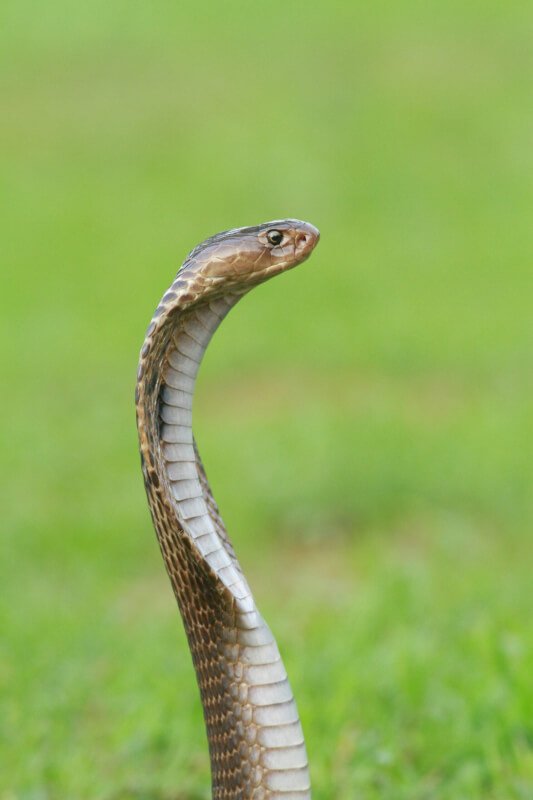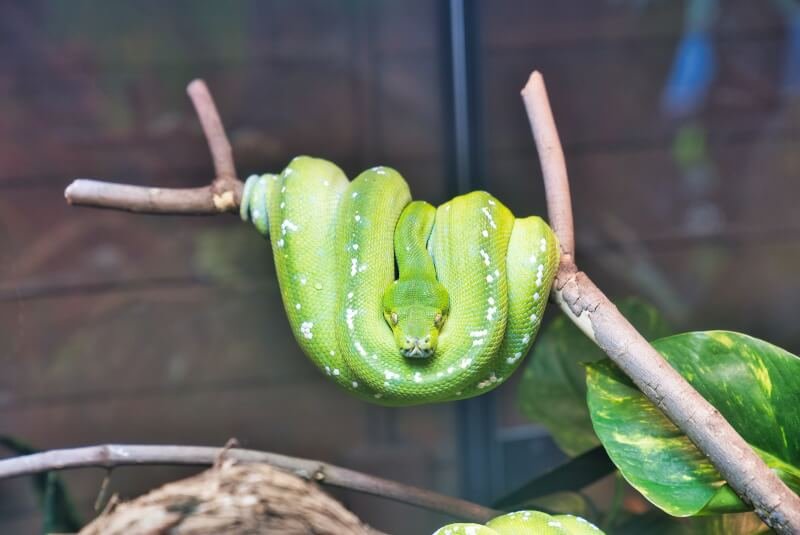If you’ve ever had a close encounter with a snake slithering through your home or garden, you know that it can be quite a heart-stopping experience. But fear not, for there are effective strategies to keep these slippery creatures at bay. In this article, we will explore simple and friendly ways you can implement to ensure a snake-free environment. So let’s roll up our sleeves and discover how you can ward off these reptilian visitors from your sanctuary. From natural deterrents to practical interventions, we’ve got you covered.
Eliminating Attractants
Maintain a Tidy Yard
One of the first steps in keeping snakes away from your home or garden is to maintain a tidy yard. Snakes are attracted to cluttered areas as they provide hiding spots. Keep your yard clean and free of debris such as piles of leaves, logs, and rocks. Regularly mow your lawn and trim bushes and shrubs to eliminate potential hiding places for snakes.
Remove Potential Food Sources
Snakes are drawn to areas where they can find their prey, such as rodents, birds, and insects. By removing potential food sources, you can reduce the likelihood of snakes being attracted to your property. Keep your garbage tightly sealed and pick up fallen fruit from trees. It is also advisable to feed pets indoors or clean up any leftover food immediately to prevent attracting rodents, which in turn can attract snakes.
Get Rid of Hiding Places
Snakes seek out areas where they can hide and feel secure. Remove or minimize hiding places around your home and garden by clearing away large piles of wood, rocks, or tall grass. Avoid having dense vegetation directly against your home’s foundation, as this can create an ideal environment for snakes. By reducing hiding spots, you can make your property less appealing to snakes.
Seal Cracks and Openings
Snakes can enter your home through even the smallest openings. Inspect your home for any cracks or openings in walls, foundations, and windows. Seal these gaps with steel wool, caulk, or other suitable materials to prevent snakes from entering your home. Remember to also check for any openings or gaps in your garage door or vents and seal them accordingly. By sealing these potential entry points, you can effectively reduce the chance of snakes finding their way inside.
Optimizing the Landscape
Create a Barrier
Creating a physical barrier around your home and garden can help keep snakes out. Use fine mesh wire or fencing with small gaps to create a barrier that snakes cannot penetrate. Install the barrier around the perimeter of your property, paying extra attention to areas where snakes are likely to enter, such as near woods or fields. This barrier can act as a deterrent and prevent snakes from accessing your property.
Use Natural Deterrents
There are certain natural substances that can act as deterrents for snakes. Plants such as marigolds, lemongrass, and wormwood are known to repel snakes due to their strong fragrance. Consider planting these around your home and garden to discourage snakes from entering. Additionally, citrus peels or garlic cloves placed strategically around your property can also deter snakes due to their strong odor.
Plant Snake-Repelling Species
Some plants have natural properties that act as snake repellents. Research snake-repelling species native to your area and consider planting them in your garden or around the perimeter of your property. Examples of snake-repelling plants include Indian snakeroot, pink agapanthus, and mother-in-law’s tongue. These plants release scents or chemicals that snakes find unappealing, making them less likely to inhabit your space.
Install Snake Fencing
Snake fencing is specifically designed to keep snakes out. It typically consists of a mesh wire fence placed at an angle, extending both above and below ground. The angle prevents snakes from climbing or burrowing under the fence. Install snake fencing around your entire yard or garden to create an effective barrier against snakes. Be sure to choose a fencing material with small holes to prevent even the smallest snakes from entering.

Taking Preventative Measures
Keep Doors and Windows Closed
To prevent snakes from entering your home, it is essential to keep doors and windows closed, especially at ground level. Snakes can easily enter through open windows or doors, so make it a habit to double-check that all entry points are securely closed. This simple precaution can significantly reduce the chances of encountering a snake inside your home.
Install Door Sweeps
Another method to keep snakes from entering your home is by installing door sweeps. Door sweeps are strips of material attached to the bottom of doors to seal the gap between the door and the floor. Snakes often slither through small openings, and door sweeps can serve as an effective barrier to prevent their entry. Make sure the door sweeps are properly installed and in good condition for optimal effectiveness.
Cover Vents and Openings
Snakes can squeeze through small openings, including ventilation openings and gaps around pipes. Install mesh covers or screens over vents and openings to prevent snakes from entering. These covers should have holes too small for snakes to pass through but still allow for proper airflow and ventilation. By covering these potential entry points, you can protect your home from unwanted snake visitors.
Inspect Firewood and Garden Supplies
Snakes are known to hide in stacked firewood or among garden supplies. When bringing firewood indoors or using gardening tools, always inspect them carefully for any signs of snakes. Wear gloves and use a flashlight to ensure there are no snakes concealed within the stack or among the supplies. Taking these precautions before bringing these items inside will help prevent snakes from entering your home.
Regularly Check for Entry Points
Perform regular inspections around your home and garden to identify any potential entry points snakes may be using. Look for gaps or cracks in walls, pipes, or other structural elements that could allow snakes to enter. Address these issues promptly by sealing or repairing the openings to prevent snakes from gaining access. By staying vigilant and addressing entry points, you can effectively keep snakes out of your home.
Implementing Snake-Repelling Tactics
Use Naphthalene Products
Naphthalene, commonly found in mothballs, can repel snakes due to its strong odor. Place mothballs strategically around your property to deter snakes from approaching. Be cautious when using naphthalene products, as they can be harmful to pets and children if ingested. Ensure that the mothballs are kept out of reach and are used in well-ventilated areas.
Apply Essential Oils
Certain essential oils have properties that repel snakes. Peppermint oil, cinnamon oil, and clove oil are known to be effective in keeping snakes away. Mix a few drops of these essential oils with water in a spray bottle and apply the solution around your home and garden. Concentrate on entry points, potential hiding spots, and areas where snakes are commonly seen. Reapply the solution regularly, especially after rainfall.
Make Use of Vinegar
Vinegar is affordable and readily available, making it a convenient snake deterrent. Mix equal parts vinegar and water in a spray bottle and generously spray the solution around your property. The strong smell of vinegar repels snakes and discourages them from entering your space. Repeat the application every few days or after rainfall, as vinegar loses its effectiveness over time.
Sprinkle Sulfur
Snakes have an aversion to sulfur, making it an effective deterrent. Sprinkle sulfur powder around your yard, garden, and other areas where snakes are unwanted. Focus on entry points, such as gaps in fences or holes in the ground. Sulfur has a strong smell, so use caution when applying it in areas frequented by pets or small children. Reapply the sulfur as needed, especially after heavy rain.
Create a Cinnamon Barrier
Cinnamon is known to repel snakes due to its strong scent. Sprinkle cinnamon powder liberally around your property, paying attention to areas where snakes may enter, such as gaps in walls or cracks in foundations. Reapply the cinnamon as needed, especially after rainfall. It is important to note that cinnamon may lose its potency over time, so regular application is necessary to maintain its effectiveness.

Using Mechanical Snake Deterrents
Install Vibrating Snake Repellers
Vibrating snake repellers are devices that emit low-frequency vibrations that mimic the vibrations caused by larger animals moving through the ground. Snakes perceive these vibrations as a sign of danger and are deterred from entering the area. Install vibrating snake repellers around the perimeter of your property or in areas where you want to keep snakes away. Follow the manufacturer’s instructions for proper installation and maintenance.
Place Snake Traps
Snake traps can be an effective way to catch and safely remove snakes from your property. Choose a snake trap that is specifically designed for the type of snakes common in your area. These traps typically consist of a box or cage with a mechanism to safely capture the snake. Check the traps regularly and release captured snakes far away from your property, preferably in a natural habitat away from residential areas.
Utilize Motion-Activated Sprinklers
Motion-activated sprinklers can be an effective deterrent for snakes. These sprinklers are equipped with motion sensors that detect the movement of snakes or other animals. When triggered, the sprinkler releases a burst of water, effectively scaring away the snake. Place motion-activated sprinklers near entry points or areas frequented by snakes to keep them at bay. Ensure that the sprinklers are properly calibrated to avoid unnecessary activation.
Make Noise to Keep Snakes Away
Snakes are sensitive to vibrations and sounds. Making noise around your property can help discourage snakes from approaching. Use a lawn mower, leaf blower, or other noisy tools regularly to disturb the peace and make your property less inviting to snakes. Additionally, installing wind chimes or other noise-making devices can help deter snakes by creating continuous vibrations. Remember to check local noise regulations before implementing these methods.
Educating Yourself About Snakes
Identify Snakes in Your Area
To effectively keep snakes out of your home or garden, it is essential to know the types of snakes common in your area. Familiarize yourself with their physical characteristics, color patterns, and behavior. This knowledge will help you understand the potential threats and take appropriate preventative measures.
Learn About Their Habits and Behavior
Understanding the habits and behavior of snakes can help you effectively deter them from your property. Learn about their preferred habitats, breeding seasons, and hunting patterns. This knowledge will enable you to implement preventative measures specific to the behavior of the snakes in your area.
Understand Snake Bite First Aid
While prevention is key, it is essential to be prepared for a snake bite emergency. Educate yourself on snake bite first aid, including proper wound cleaning techniques, immobilization methods, and when to seek medical attention. Familiarize yourself with the local emergency contact numbers and keep a snake bite first aid kit readily available in case of an emergency.
Seek Professional Help
If you are unsure about how to handle a snake problem or have concerns about venomous snake encounters, it is best to seek professional help. Contact your local animal control or snake removal experts who have the knowledge and experience to safely handle snakes. Professional assistance can provide peace of mind and ensure that snakes are removed from your property in a humane and safe manner.
Handling Encounters with Snakes
Stay Calm and Back Away
If you encounter a snake, it is important to remain calm and avoid making sudden movements that may startle the snake. Back away slowly, giving the snake space to retreat. Remember that most snakes prefer to avoid confrontation and will typically try to escape if given the opportunity.
Avoid Provoking or Touching Snakes
It is crucial to avoid provoking or touching snakes, especially if you are uncertain of their species. Snakes may feel threatened if they are cornered or handled, and they may become defensive and potentially bite. Keep a safe distance and observe the snake from afar rather than attempting to interact with it.
Do Not Try to Capture or Kill Snakes
Unless you have the proper training and knowledge, it is not recommended to capture or kill snakes yourself. Attempting to handle or kill a snake can be dangerous and may lead to accidental bites. Instead, focus on implementing preventative measures to keep snakes away and contact professionals trained in snake handling and removal.
Contact Local Animal Control or Snake Removal Experts
If you have a snake problem that you are unable to handle on your own, it is best to contact your local animal control or snake removal experts. These professionals have the necessary tools and expertise to safely remove snakes and relocate them to a more suitable habitat. They can also provide advice on preventing future snake encounters and assist with any concerns or questions you may have.
Creating a Snake-Friendly Environment
Install Snake Boxes
If you live in an area where snakes are common, consider installing snake boxes or shelters. These structures provide snakes with an alternative habitat, encouraging them to reside in designated areas away from your home or garden. Snake boxes are usually made of wood or concrete and are placed in secluded parts of your yard or property.
Provide Alternate Habitat
To reduce the chance of snakes seeking shelter in your home or garden, create alternative habitats for them elsewhere on your property. Leave sections of your yard undisturbed or create compost piles and brush piles in a remote location. Providing snakes with a suitable alternative habitat can help keep them away from areas where they are not wanted.
Embrace Natural Predators
Encouraging natural predators that feed on snakes can help keep their population in check. Birds of prey such as hawks or owls are natural snake hunters and often help control snake populations. Attract these birds to your property by providing suitable perches, nesting boxes, and food sources. Creating a balance in the ecosystem can assist in managing snake populations naturally.
Considering Exclusion Methods
Install Snake-Proof Fencing
Snake-proof fencing is a highly effective method to keep snakes out of specific areas. These fences are constructed with materials and designs that prevent snakes from slithering through or climbing over them. Install snake-proof fencing around your garden, outdoor play areas, or other areas where keeping snakes out is a priority. Be sure to choose a fence design that is suitable for the types of snakes in your area.
Use Pest Control Services
Controlling pests such as rats or mice can indirectly help reduce snake populations. Snakes are attracted to areas where they can find their preferred food sources, and reducing the prey population can make your property less desirable for snakes. Consider employing professional pest control services to address any pest infestations and create an environment that is less attractive to snakes.
Hire a Snake Removal Expert
If you are facing persistent snake problems or are unsure how to effectively exclude them from your property, consider hiring a snake removal expert. These professionals have the knowledge and experience to assess your property, identify potential entry points, and provide recommendations tailored to your specific situation. They can also assist with snake removal if necessary.
Regular Maintenance and Vigilance
Keep Vegetation Trimmed
Regularly trimming and maintaining vegetation around your property can help deter snakes. Trim back bushes, shrubs, and overhanging tree branches near your home, creating a clear and open space that snakes are less likely to inhabit. Additionally, keeping grass and weeds short reduces potential hiding spots for snakes.
Inspect Outdoor Structures
Regularly inspect outdoor structures such as sheds, garages, and playhouses for any signs of snake activity. Look for shed snake skins, snake droppings, or any other indications that snakes may have entered these structures. Seal any gaps, cracks, or openings that could serve as entry points, ensuring that snakes cannot find their way inside.
Monitor for Signs of Snake Activity
Stay vigilant and monitor your property for signs of snake activity. Look for snake tracks, nests, or shed skins in and around your yard. Stay aware of any changes in your environment that may suggest the presence of snakes. By promptly addressing any signs of snake activity, you can take proactive measures to keep snakes out of your home and garden.
Address Issues Promptly
If you notice any potential issues that may attract snakes or provide them with opportunities to enter your property, address them promptly. Whether it is a leaky faucet, a broken fence, or a gap in your foundation, fixing these issues can help prevent snakes from being drawn to your home. Regular maintenance and timely repairs are crucial in maintaining a snake-free environment.
In conclusion, with a combination of preventative measures, snake-repelling tactics, and environmental modifications, you can effectively keep snakes out of your home and garden. By eliminating attractants, optimizing your landscape, taking preventive measures, implementing repelling tactics, using mechanical deterrents, educating yourself, and practicing vigilance, you can create a snake-resistant environment. Remember to respect and appreciate snakes’ role in the ecosystem and consider seeking professional help when needed. With these strategies in place, you can enjoy a snake-free living space while promoting a safe and balanced habitat for all.



